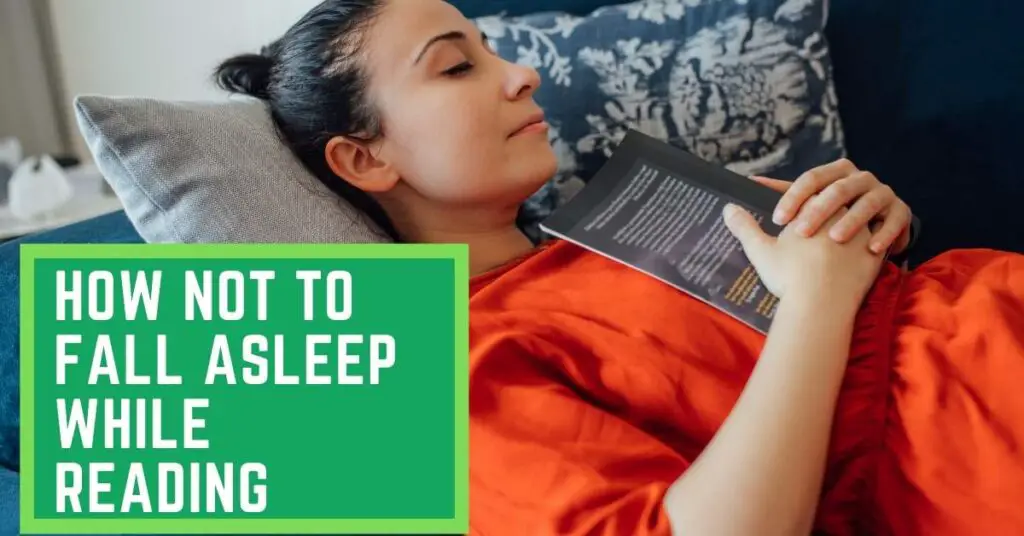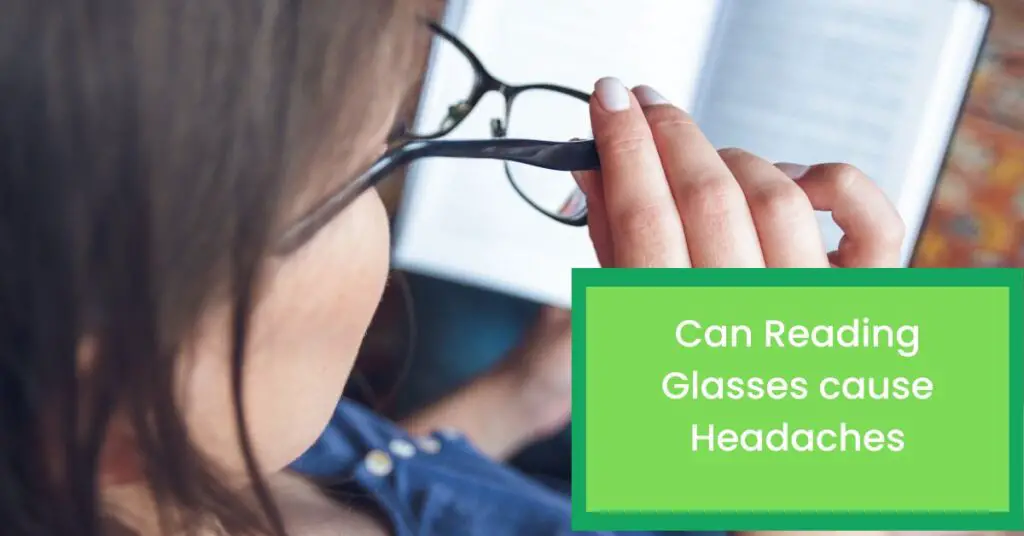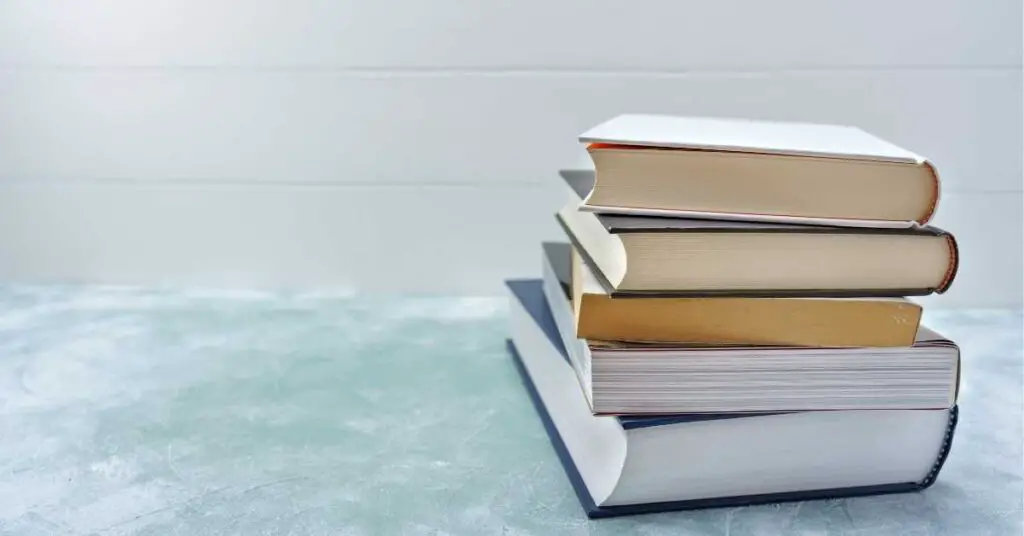We all know that feeling. You pick up a book with the intention of reading just a few pages before bed, and the next thing you know, your head is drooping, and the words are blurring together. In this article, we will look at some tips on how to stay awake while reading.
First, make sure you’re in a comfortable position. If you’re slumped over in an uncomfortable chair or lying in bed with the lights off, it’s no wonder you’re falling asleep. Instead, try sitting up in a well-lit room or even taking a walk while you read. The fresh air will do you good and help keep you awake.
Second, take breaks often. Every 20 minutes or so, stand up and stretch or walk around for a minute. This will help keep your blood flowing and prevent you from getting too comfortable.
Third, try reading something that’s interesting to you. If you’re bored with what you’re reading, it’s no wonder you’re struggling to stay awake. Choose a book or article that’s truly engaging and see if that makes a difference.
Finally, if all else fails, consider caffeine. A cup of coffee or tea can do wonders for keeping you awake and focused. Just be careful not to overdo it – too much caffeine can have the opposite effect!
With these tips in mind, you should be able to power through even the most boring book without falling asleep. Now let’s dig a little deeper and have a descriptive conversation to find out all the possible measures that could help you not fall asleep while reading.
Tips not to Fall Asleep
01. Have a Cup of Coffee

It’s true that caffeine can help to keep you awake, but it’s also important to be sure that you’re getting enough sleep in the first place. Most people need around eight hours of sleep per night.
And if you’re not getting that, then caffeine can certainly help to make up for a lost time. But if you’re routinely getting less than eight hours of sleep per night, then caffeine can actually start to have a negative effect on your health.
02. Wash your Face & Eyes
Yes! It’s important to keep your face and eyes clean, so you don’t fall asleep while reading. Eye fatigue is a common cause of falling asleep while reading and can be caused by factors such as eyestrain, dry eyes, blinking too little, or staring at a fixed point for a long time.
Washing your face and eyes regularly helps to remove any built-up dirt or oil that can cause irritation and lead to eye fatigue. It’s also important to drink plenty of water throughout the day to keep your eyes hydrated and help reduce the risk of eye fatigue.
So make sure to wash your face and eyes regularly, drink plenty of water, and take breaks from often reading to give your eyes a chance to rest.
03. Never think of pending to be Read
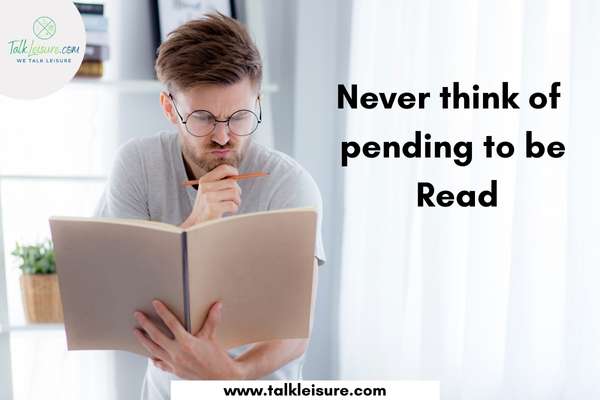
There’s some truth to this – if you’re anxious about not being able to finish a book, it’s more likely that you’ll fall asleep while reading. However, the solution is not to stop thinking about pending books but rather to find a way to relax and focus on the task at hand. Here are a few tips:
Make sure you’re getting enough sleep. If you’re exhausted, it’s going to be harder to stay focused while reading. Take breaks every hour or so. Get up and move around, or sit and take a few deep breaths.
Dim the lights or use an eye mask if you find it difficult to keep your eyes open in a bright room. If you’re really struggling, try reading aloud – it can help to keep you awake and engaged with the text.
04. Do not Stay in Comfort
There’s some truth to the idea that making yourself uncomfortable can help you avoid falling asleep while reading. If you’re constantly changing positions or moving around, it’s harder for your body to relax and fall into a sleep state.
So if you find yourself nodding off while reading, try standing up, pacing around, or even doing some jumping jacks to wake yourself up. And, of course, if you’re truly tired, there’s no shame in putting the book down and getting some rest.
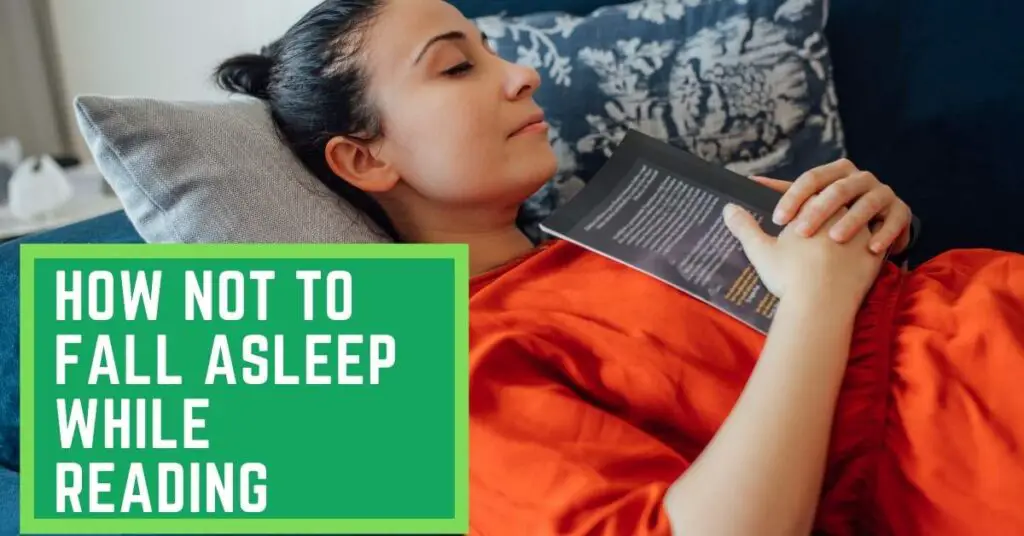
05. Read a little loud
It’s been scientifically proven that reading aloud helps you stay more engaged and awake while reading. When you read silently to yourself, your mind can wander, and you may start to daydream. But if you’re reading out loud, your mind is more focused on the words, and you’re less likely to doze off.
So the next time you’re feeling sleepy while trying to read a book, try reading out loud instead and see if it helps keep you more alert. You may be surprised at how much better you’ll be able to focus, and how much longer you’ll be able to stay awake.
06. Have Bright Light

There is evidence that bright light can help prevent people from falling asleep while reading. In one study, participants were given a book to read and exposed to bright or normal room light.
The participants who were exposed to the bright light took longer to fall asleep and had less drowsiness while reading than the participants who were not exposed to the bright light.
It’s thought that exposure to bright light helps suppress the production of melatonin, which is a hormone that helps regulate sleep-wake cycles. When people are exposed to bright light during the day, it inhibits the production of melatonin and helps them stay alert.
So, if you find yourself falling asleep while reading, try getting some exposure to bright light, either by turning on a lamp or by going outside for a few minutes.
07. Get an Encouraging Atmosphere

Getting an encouraging atmosphere helps you to avoid falling asleep while reading. If you have a comfortable place to read, where you feel relaxed and supported, it will be easier to stay awake. Make sure there is good lighting and that you’re not reading in an uncomfortable position.
Find a time of day when you’re likely to be alert and stick to a regular reading schedule. You may also want to try music or other noise in the background to help keep you awake. Lastly, avoid sugary foods or drinks before reading as they can make you drowsy.
08. Don’t let any other thing Draw Your Attention
There are a couple of different things you can do to make sure you stay alert while reading. One is to keep your focus on the task at hand.
It’s easy to get distracted if you’re reading in a noisy environment or your mind starts to wander, but you’ll be less likely to doze off by keeping your attention on the words in front of you.
Another thing that can help is to take breaks every few pages. Get up and move around for a minute or two; drink some water; and spend a few minutes breathing deeply and stretching.
This will help refresh your body and mind, making it easier to focus later on. And finally, make sure that you’re getting enough sleep each night.
09. Have an Energy Boosting Snack

Yes, having an energy-boosting snack can help you to avoid falling asleep while reading. For example, if you are feeling sleepy while reading, having a small snack like a handful of nuts or some fruit will help give you the energy boost you need to stay awake.
Of course, it is always important to make sure that you are not overeating, as this can also lead to drowsiness. If you find that you are struggling to stay awake while reading, it might be best to take a break and come back to it later when you are more alert.
10. Walk a little in the Room
There’s definitely something to be said for getting up and moving around a bit when you start feeling drowsy while reading. For one thing, it can help wake you up and keep you from passing out completely. But beyond that, walking around can also help improve your focus and concentration.
Moving your body forces your brain to be actively engaged with what’s going on around you rather than zoning out. Plus, the increased blood flow can help deliver more oxygen to your brain, which can improve cognitive function.
So if you find yourself nodding off while reading, take a little walk around the Room – it just might help you stay awake and better able to focus on what you’re reading.
11. Have a Good Amount of Sleep

It’s definitely a good idea to get a good amount of sleep if you want to avoid falling asleep while reading. Generally, adults need around 7-8 hours of sleep per night, but this varies from person to person. Depending on their lifestyle and body type, some people may need more or less sleep.
If you’re not getting the recommended amount of sleep each night, your body will start to feel tired and sluggish. This can make it difficult to focus on anything for an extended period of time, including reading. So getting the proper amount of sleep is definitely key in avoiding dozing off while reading!
12. Leave Easy Materials to Read at Last
Reading easy materials at the final stage of your preparation can help you avoid falling asleep while reading. If you are accustomed to reading difficult materials, then your brain can get tired quickly and fall asleep.
However, reading easy materials at the end of your study session will help keep your mind fresh and alert. Additionally, taking short breaks between study sessions can also help refresh your mind and body and improve concentration.
Visual Explanations
i. Expert talks about slow reading:
ii. Expert talks about falling asleep while reading:
Related Matters
01. What is a narcoleptic episode?
There are many different types of narcolepsy, but all sufferers experience sudden and uncontrolled sleepiness episodes.
These sleeping episodes can happen at any time, day or night, and last anywhere from a few seconds to several minutes. Some people with narcolepsy also experience hallucinations and paralysis just before falling asleep or upon waking up.
The cause of narcolepsy is not currently known, though it is thought to be related to abnormalities in the brain’s ability to produce the chemical hypocretin (also known as orexin).
This chemical helps regulate sleep and wakefulness. People with narcolepsy have been found to have very low levels of hypocretin in their brains.
02. Why do I fall asleep when I am reading?
It’s very common to feel sleepy when reading. The reason is that reading is a mentally stimulating activity, and when we’re mentally stimulated, it can be difficult to stay awake.
In addition, when we’re sitting still for an extended period of time, our bodies naturally produce more of the sleep-promoting hormone melatonin. So it’s not uncommon to feel sleepy when reading or doing any other type of sedentary activity.
03. Why do I fall asleep in front of the books but not the TV?
There are a few reasons why people might fall asleep while reading, but one of the primary reasons is that reading requires more focus than watching TV.
When people watch TV, their brain is in a passive state and can easily wander, but when people are reading, they’re engaged in a mentally stimulating activity.
Another reason people might fall asleep while reading is because they’re not getting enough sleep overall. If someone is chronically sleep-deprived, their body may start to nod off to conserve energy.
So if you find yourself falling asleep while reading, make sure you’re getting enough quality sleep every night.
04. Using caffeine while reading is bad?
No, caffeine does not necessarily impede reading comprehension. It has been shown that caffeine can have small positive effects on cognitive function and task performance.
However, large doses of caffeine (more than 500 mg) can produce negative side effects such as anxiety, restlessness, and headaches. For most people, a moderate dose of caffeine (200-300 mg) generally results in the desired level of stimulation without causing these negative side effects.
So if you’re looking to maximize your reading comprehension while avoiding any potential negative side effects, a moderate dose of caffeine should do the trick.
05. Reading till late at night is bad?
It’s not necessarily bad to read till late at night, but it can be if it disrupts your sleep schedule.
Most people need around 8 hours of sleep a day in order to feel rested and function at their best. If you’re staying up late reading and then trying to get up early for work or school, you’re going to be dragging all day.
Try to establish a regular sleep schedule where you go to bed and wake up at the same time each day, even on weekends. That way, your body will know when it’s supposed to be asleep and when it’s supposed to be awake, and you’ll start feeling more refreshed overall.

